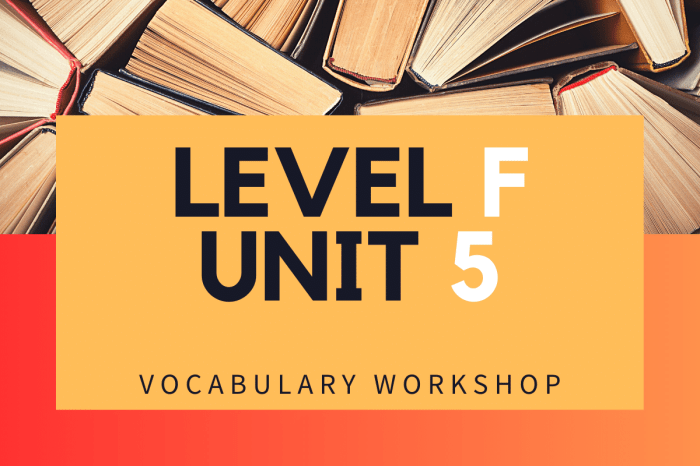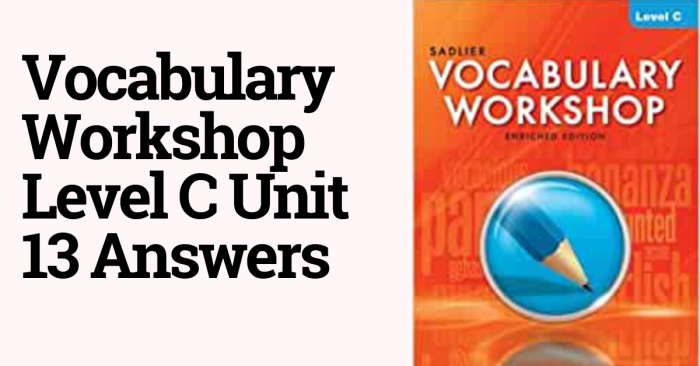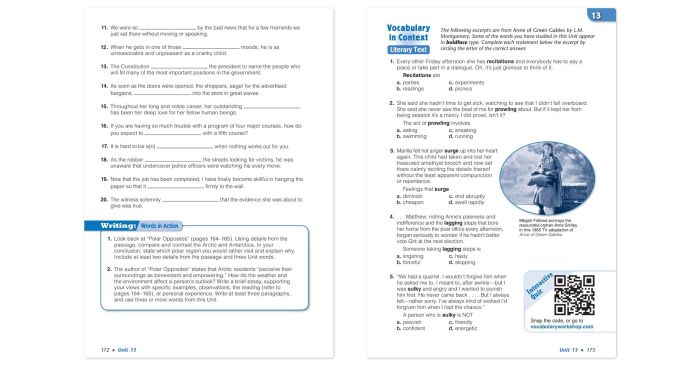Answers to Vocabulary Workshop Level A offers a comprehensive guide to vocabulary development, providing effective strategies and activities to enhance language proficiency. By exploring the importance of vocabulary, types of vocabulary, and word analysis, this guide empowers learners to expand their vocabulary and communicate effectively in various contexts.
Through interactive exercises and a discussion of the role of technology in vocabulary development, this guide provides a practical and engaging approach to vocabulary learning.
Vocabulary Development Strategies

Vocabulary development is crucial for language proficiency. It enhances comprehension, expression, and overall communication skills. To expand vocabulary effectively, consider strategies such as reading widely, utilizing flashcards, and engaging in word games.
Reading exposes learners to a wide range of words in context, fostering natural acquisition. Flashcards aid in memorization and active recall. Word games, like crosswords or Scrabble, provide an entertaining and interactive way to practice vocabulary.
Context and Vocabulary Acquisition
Context plays a pivotal role in vocabulary acquisition. When words are encountered in meaningful contexts, learners can infer their meaning and retain them better. Encourage learners to read diverse texts and engage in discussions to expand their vocabulary naturally.
Types of Vocabulary

Vocabulary can be categorized into different types, each serving a specific purpose and context.
Academic Vocabulary
Academic vocabulary consists of words used in scholarly and professional settings. It is characterized by precise and specialized terms, often found in textbooks, research papers, and formal presentations.
Technical Vocabulary
Technical vocabulary pertains to specific fields or industries. It includes specialized terms and jargon used in science, technology, medicine, and other technical domains.
Informal Vocabulary
Informal vocabulary encompasses words used in everyday conversations and informal settings. It is characterized by colloquialisms, slang, and expressions that may not be appropriate in formal contexts.
Word Analysis and Root Recognition: Answers To Vocabulary Workshop Level A
Analyzing word structure and recognizing root words enhance vocabulary comprehension and retention.
Word Structure
Breaking down words into their prefixes, suffixes, and roots reveals their meaning and relationships to other words. For instance, “unhappy” consists of the prefix “un-” (not) and the root “happy.” This analysis helps learners understand the word’s negation.
Root Recognition
Identifying root words allows learners to connect new words to existing knowledge. For example, recognizing the root “scrib” (write) in words like “inscribe” and “subscribe” facilitates understanding of their related meanings.
Vocabulary Practice Activities
Interactive activities reinforce vocabulary learning and make it enjoyable.
Crossword Puzzles
Crossword puzzles challenge learners to fill in words that fit specific clues, enhancing spelling and vocabulary.
Word Searches
Word searches involve finding words hidden within a grid of letters, improving visual scanning and word recognition.
Fill-in-the-Blank Exercises
Fill-in-the-blank exercises provide learners with sentences with missing words, encouraging active recall and context-based vocabulary usage.
Technology and Vocabulary Development

Technology offers valuable tools for vocabulary enhancement.
Online Resources
Online dictionaries, thesauruses, and vocabulary apps provide quick access to word definitions, synonyms, and usage examples.
Mobile Apps, Answers to vocabulary workshop level a
Mobile apps offer interactive games, quizzes, and personalized vocabulary lists, making learning convenient and engaging.
Limitations
While technology can supplement vocabulary development, it should not replace traditional methods like reading and context-based learning. Over-reliance on technology may lead to passive learning and limited understanding.
Questions and Answers
What is the importance of vocabulary development for language proficiency?
Vocabulary development is crucial for language proficiency as it enables individuals to comprehend and express complex ideas, communicate effectively in various contexts, and enhance their overall language skills.
How can I effectively expand my vocabulary?
Effective vocabulary expansion strategies include reading widely, using flashcards, engaging in word games, and actively using new words in conversations and writing.
What is the role of context in vocabulary acquisition?
Context plays a vital role in vocabulary acquisition as it provides meaningful connections between words and their usage, aiding in comprehension and retention.